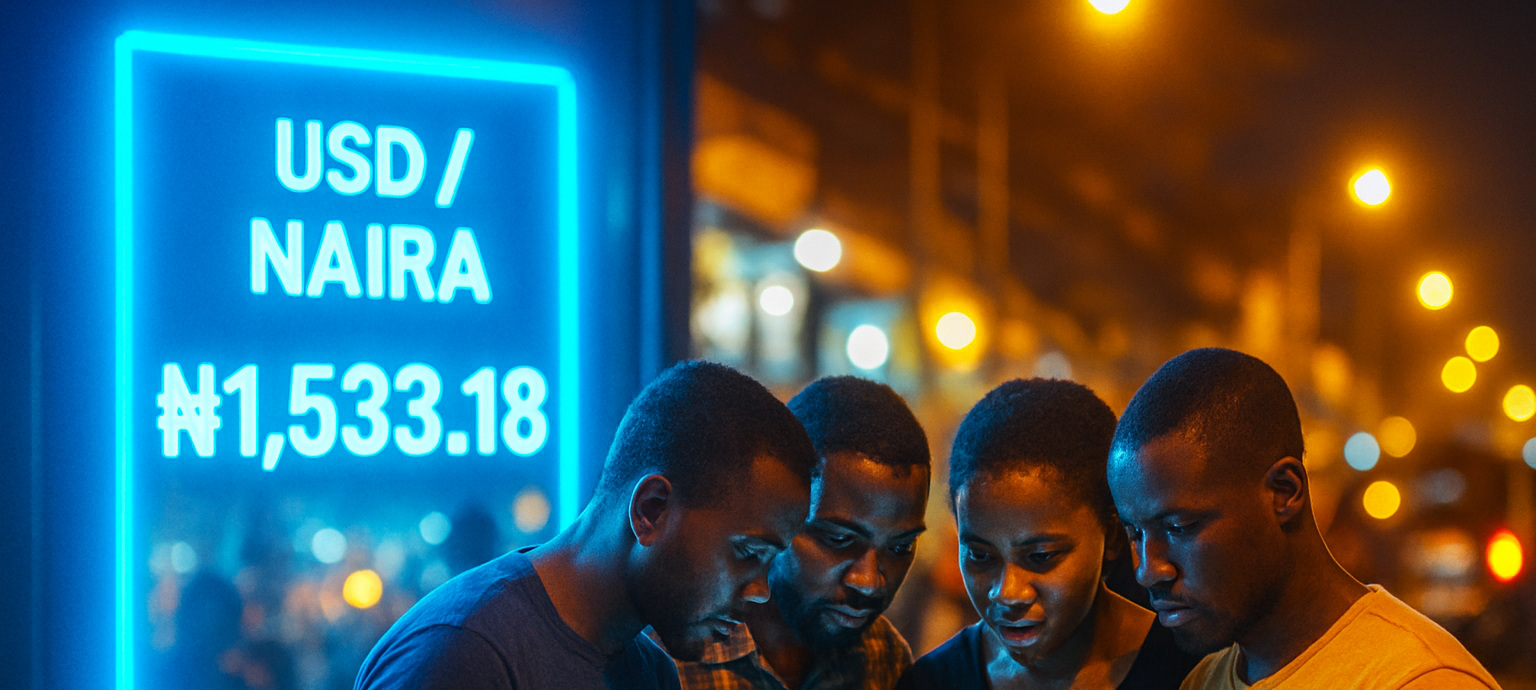
Understanding Naira Exchange Rates: USD to Naira in 2025
Author Noella Lepdung
The USD to Naira exchange rate continues to shape Nigeria’s economy in 2025.
With rates fluctuating between ₦1,490 and ₦1,637 per dollar, the exchange rate affects everything — from business imports to school fees abroad and even everyday online purchases.
As of August 2025, understanding how these rates work can help you make smarter financial decisions, whether you’re investing, saving, or planning international transactions.
Current USD to Naira Exchange Rates in 2025
As of August 2025, the USD to NGN exchange rate stands at approximately ₦1,533.18 according to the Central Bank of Nigeria (CBN), while black market rates hover around ₦1,567. This represents a significant evolution from early 2025, when rates dipped to ₦1,490 in February before reaching highs of ₦1,637 in April.
The average USD to Naira exchange rate in 2025 has been ₦1,547.61, reflecting the ongoing volatility in Nigeria's foreign exchange market. For specific conversions, whether you need to convert 39 USD to NGN or larger amounts like 50,000 USD to NGN, these fluctuations directly impact the naira equivalent you receive
| Rate Type | Current Rate | 30-Day Range | Volatility |
|---|---|---|---|
| CBN Official | ₦1,533.18 | ₦1,523 – ₦1,559 | Low |
| Black Market | ₦1,567 | ₦1,550 – ₦1,580 | Moderate |
| NFEM (Unified Market) | ₦1,525.27 | ₦1,515 – ₦1,540 | Low |
The narrowing gap between official and black-market rates reflects the CBN’s reforms to unify Nigeria’s exchange system.
Key Factors Influencing Naira Exchange Rates in 2025
1. Central Bank of Nigeria Policy Reforms
The CBN has implemented several market-driven reforms in 2025, including:
- Unified exchange rate system through the Nigerian Foreign Exchange Market (NFEM)
- Removal of exchange rate caps for International Money Transfer Operators
- Prohibition of dollar-denominated collateral for naira loans
- Interest rate adjustments to combat inflation
These moves are gradually improving liquidity and restoring investor confidence.
2. Foreign Exchange Reserves and Liquidity
Nigeria's forex reserves, currently at approximately $33.37 billion, remain below optimal levels. The CBN has cleared over $2.5 billion of the accumulated forex backlog, improving market liquidity and reducing parallel market premiums.
3. Oil Prices and Export Performance
As Nigeria’s top foreign exchange earner, oil prices remain a key determinant of naira strength.
When oil prices rise, export revenue increases — strengthening the naira.
However, a fall in oil demand or price quickly weakens it.
4. Inflation and Interest Rate Policies
The CBN’s Monetary Policy Rate (27.50%) affects both the value of the naira and borrowing costs in Nigeria. Higher rates attract foreign capital and slow down inflation, but can make credit more expensive domestically.
These policies ripple through loan interest rates and investment yields across Nigeria’s financial sector.
USD to Naira Exchange Rate Forecast (2025–2026)
Short-Term (Next 3 Months)
Analysts project moderate volatility, with rates expected to trade within ₦1,500–₦1,600 per dollar.
Short-term movements will depend on:
-
Seasonal forex demand
-
Oil revenue inflows
-
CBN interventions based on reserves
Medium-Term (2025–2026)
Period Predicted Range Average Rate Key Drivers Q4 2025 ₦1,515 – ₦1,580 ₦1,547 CBN reforms, oil performance Q1 2026 ₦1,480 – ₦1,620 ₦1,550 Structural economic changes Q2 2026 ₦1,450 – ₦1,600 ₦1,525 Export diversification Long-Term Outlook (2025–2030)
Long-term projections indicate potential naira strengthening — with some models forecasting USD/NGN around ₦707 by 2030.
This scenario depends on:-
Diversifying exports beyond oil
-
Attracting sustainable foreign investment
-
Improved fiscal discipline and forex management
Impact on Nigerian Businesses and Individuals
For Importers
Current exchange rate levels affect import costs significantly. A $10,000 import transaction costs approximately ₦15.3 million at official rates compared to ₦15.7 million on the parallel market.
For Students and Travelers
International education and travel expenses remain elevated. Whether converting 450 USD to NGN for monthly expenses or larger amounts, exchange rate fluctuations significantly impact costs.
For Exporters and Businesses
Naira depreciation benefits exporters by making Nigerian goods more competitive internationally. Businesses seeking financing can explore various business loan options to expand operations during favorable exchange periods.
How to Get the Best Exchange Rates
-
Official Channels
- Commercial banks offer CBN rates for legitimate transactions
- Bureau de Change operators provide licensed forex services
- International money transfer services with competitive rates
-
Market Timing
- Monitor daily rate fluctuations using reliable sources
- Consider forward contracts for large transactions
- Track CBN policy announcements for rate-moving events
-
Digital Platforms and Savings Strategies
For individuals managing foreign exchange needs, comparing options is crucial. Consider exploring money-saving apps versus traditional banks to optimize your savings while navigating exchange rate volatility.
Managing Exchange Rate Risk
For Businesses
- Hedge foreign exchange exposure through forward contracts
- Diversify supplier base to reduce dollar dependency
- Invoice in naira, where possible, for domestic transactions
For Individuals
- Plan international expenses during favorable rate periods
- Use official channels to avoid parallel market premiums
- Monitor rate trends before making large conversions
Frequently Asked Questions
Q: What is the current USD to Naira rate? As of August 2025, the official CBN rate is ₦1,533.18 per dollar, while parallel market rates average ₦1,567.
Q: Why do official and black market rates differ? The gap reflects forex supply constraints, regulatory restrictions, and market demand dynamics, though recent CBN reforms have narrowed this spread.
Q: Will the naira strengthen in 2025? Short-term forecasts suggest continued volatility, but medium-term projections indicate potential strengthening based on economic reforms and improved export performance.
Q: How can I track exchange rate changes? Use reliable sources like CBN official rates, verified financial platforms, and authorized forex dealers for accurate, real-time information.
Q: What factors most influence naira exchange rates? Oil prices, CBN monetary policy, forex reserves, inflation rates, and global economic conditions are primary drivers of naira volatility.
Q: How do exchange rates affect loan rates? Currency fluctuations can impact interest rates on foreign currency loans and influence domestic lending conditions, affecting various types of personal loans available to Nigerians.
Conclusion
The USD to Naira exchange rate in 2025 reflects Nigeria's ongoing economic transformation and policy reforms. While short-term volatility persists, the CBN's unified market approach and structural reforms provide hope for long-term stability.
Understanding these dynamics enables informed financial decisions, whether you're planning international transactions, investments, or business operations. For those looking to finance major purchases or investments, explore exclusive savings promotions and offers from Nigerian banks to maximize your financial opportunities during currency fluctuations.
Stay informed through reliable sources and consider professional advice for significant forex exposures. Monitor official CBN communications and verified financial platforms to navigate Nigeria's evolving currency landscape effectively, ensuring you get the best value whether converting small amounts or substantial sums for business or personal use.
-
About Author

Noella Lepdung
Noëlla Lepdung is a writer who makes magic with all sorts of content, helping businesses find their voice and meet their ambitions with cutting-edge but human-first advertising. Her portfolio features brands such as Budweiser, The Coca-Cola Company, Nivea, Leadway Group, Honeywell Foods, Monieworx, Kimberly-Clark, and WAMCO.











